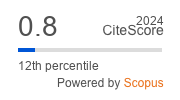EXPERIMENTAL SUPPORT OF MAGNETRON NICKEL OXIDE CATHODE FABRICATION PROCESS
https://doi.org/10.17073/1609-3577-2015-4-285-290
Abstract
This work is an experimental justification of the choice of temperature and time modes designed for the heat treatment of real magnetrons, the end result of which is the initial decomposition of barium carbonate to barium oxide. We have experimentally determined the temperatures of polymorphic transitions in barium carbonate and the temperature of barium carbonate dissociation in different atmospheres, i.e. air, argon, carbon dioxide and in vacuum, for physical modeling of processes occurring in pumped magnetrons. We have determined the phase composition of the test barium carbonate specimen at room temperature by X−ray phase analysis (XPA) on a diffractometer before and after heating and experimentally investigated the effect of temperature and time of isothermal exposure on the phase composition on a high temperature diffractometer. We have studies the chemical and physicochemical processes occurring in the samples during heating using a derivatograph. We have calculated the enthalpy of the polymorphic transitions and the activation energy of dissociation. We have presented quantitative data characterizing the kinetics of phase transitions for various heat treatment modes and demonstrated the temperature existence ranges of different phases. We have established that reducing the heating rate and increasing the time of heating interruptions slow down the process of BaCO3 to BaO transition. We have established that sintering of the powder occurs during heating of barium carbonate.
About the Authors
I. Yu. KuchinaRussian Federation
Irina Yu. Kuchina — Junior Researcher, Engineer
4 Leninsky Prospekt, Moscow 119049
N. I. Polushin
Russian Federation
Nikolay I. Polushin — Cand. Sci. (Eng.), Associate Professor
4 Leninsky Prospekt, Moscow 119049
E. S. Zakharova
Russian Federation
Elena S. Zakharova — Engineer
4 Leninsky Prospekt, Moscow 119049
I. P. Li
Russian Federation
Illarion P. Li — Cand. Sci. (Eng.), Scientific Supervisor of the Enterprise
11 N. Syromiatnicheskaya Str., Moscow 105120
V. S. Petrov
Russian Federation
Vladimir S. Petrov — Cand. Sci. (Eng.), Associate Professor, Engineer−Technologist
11 N. Syromiatnicheskaya Str., Moscow 105120
V. I. Kapustin
Russian Federation
Vladimir I. Kapustin — Dr. Sci. (Phys.−Math.), Professor, Chief Specialist
78 Vernadsky Ave., Moscow 119454
N. E. Ledentsova
Russian Federation
Natalya E. Ledentsova2,4 — Leading Engineer-Technologist Postgraduate Student
References
1. Melnikova I. P. Razrabotka tehnologicheskih processov izgotovleniya katodnih sistem s uluchshennimi fiziko−tehnicheskimi harakteristikami dlya moschnih elektrovakuumnih priborov: avtoref. diss. ... d−ra tehn. nauk. [Development of technological processes of manufacture of the cathode system with improved physical and technical characteristics of powerful vacuum devices: avtoref. diss. ... Dr. Tech. Sci.]. Saratov., 2014. 38 p. (In Russ.)
2. Kapustin V. I., Li I. P. Scandate cathode microwave devices: achievements and prospects. Elektronika: nauka, tehnologiya, biznes. 2015, no. 2. pp. 124—136. (In Russ.)
3. Djubua B. Ch., Korolev A. N. Modern effective cathodes (To the history of their creation in FSUE «RPC «Istok»). Elektronnaya tekhnika. Ser. 1, SVCh-tekhnika = Electronic engineering. Ser. 1. Microwave Engineering. 2011, no. 1. pp. 5—24. (In Russ.)
4. Marchenko V. B. Sovremenie katodi [Modern cathodes]. Moscow; Leningrad: Gosenergoizdat, 1958. 34 p. (In Russ.)
5. Polushin N. I., Kuchina I. Yu., Maslov A. L. Sverhtverdie materiali. Rentgenograficheskie, elektronno−mikroskopicheskie i derivatograficheskie metodi issledovaniya sverhtverdih materialov [Superhard materials. X−ray diffraction, electron microscopic methods and derivative−graphic studies of superhard materials.]. Moscow: MISIS, 2014. 57 p. (In Russ.)
6. Turukbaeva A. K. Determination of the activation energy for the oxalate neodymium (REE) method differentialating analysis in the DELPHI program. Sbornik materialov V Mejdunarodnoi nauchno−prakticheskoi konferencii Nauchnie issledovaniya: ot teorii k praktike. Cheboksary, 2015, pp. 28—33. (In Russ.)
7. Gorshkov V. S., Timashev V. V., Savel’ev V. G. Metody fiziko− himicheskogo analiza vyazhushchih veshchestv [Methods of physicochemical analysis of binding agents]. Moscow: Vysshaya shkola, 1981. 335 p. (In Russ.)
8. Piloyan G. O. Vvedenie v teoriyu termicheskogo analiza [Introduction to the theory of thermal analysis]. Moscow: Nauka, 1964. 233 p. (In Russ.)
9. Gorelik S. S., Skakov Y. A., Rastorguev L. N. Rentrenograficheskii i elektronno−opticheskii analiz [X−ray and electron− optical analysis]. Moscow: MISIS, 2002. 360 p. (In Russ.)
10. Kuchina I. Yu., Polushin N. I., Stepareva N. N. Research graphitization of diamond using high−temperature diffraction. Izvestiya visshih uchebnih zavedenii. Himiya i himicheskaya tehnologiya. 2013, vol. 56, no. 7, pp. 24—26. (In Russ.)
11. Gerasimov Ya. I., Dreving V. P., Eremin E. N., Kiselev A. V., Lebedev V. P., Panchenkov G. M., Shlygin A. I. Kurs fizicheskoj himii [Course in physical chemistry]. Moscow: Khimiya, 1973. Vol. 2, 624 p. (In Russ.)
12. Ledentsova N. E. Elektronnaya struktura i tehnologii oksidno− nikelevih katodnih materialov: diss. ... kand. tehn. nauk [Electronic structure and technology of oxide−nickel cathode materials: diss. ... cand. tech. sci.]. Moscow, 2016. 145 p. (In Russ.)
13. Braun M., Dollymore D., Galway A. Reakcii tverdyh tel [Reactions of Solids]. Moscow: Mir, 1983. 360 p. (In Russ.)
14. Ahmetov T. G. Himiya i tekhnologiya soedinenij bariya [Chemistry and technology of compounds of barium]. Moscow: Khimiya, 1974. 152 p. (In Russ.)
15. Nikonov B. P. Oksidnyj katod [Oxide cathode]. Moscow: Energiya, 1979. 237 p. (In Russ.)
16. Moizhes B. Ya. Fizicheskie processy v oksidnom katode [Physical processes in oxide cathode]. Moscow: Nauka, 1968. 479 p. (In Russ.)
Review
For citations:
Kuchina I.Yu., Polushin N.I., Zakharova E.S., Li I.P., Petrov V.S., Kapustin V.I., Ledentsova N.E. EXPERIMENTAL SUPPORT OF MAGNETRON NICKEL OXIDE CATHODE FABRICATION PROCESS. Izvestiya Vysshikh Uchebnykh Zavedenii. Materialy Elektronnoi Tekhniki = Materials of Electronics Engineering. 2015;18(4):285-290. (In Russ.) https://doi.org/10.17073/1609-3577-2015-4-285-290
JATS XML





































